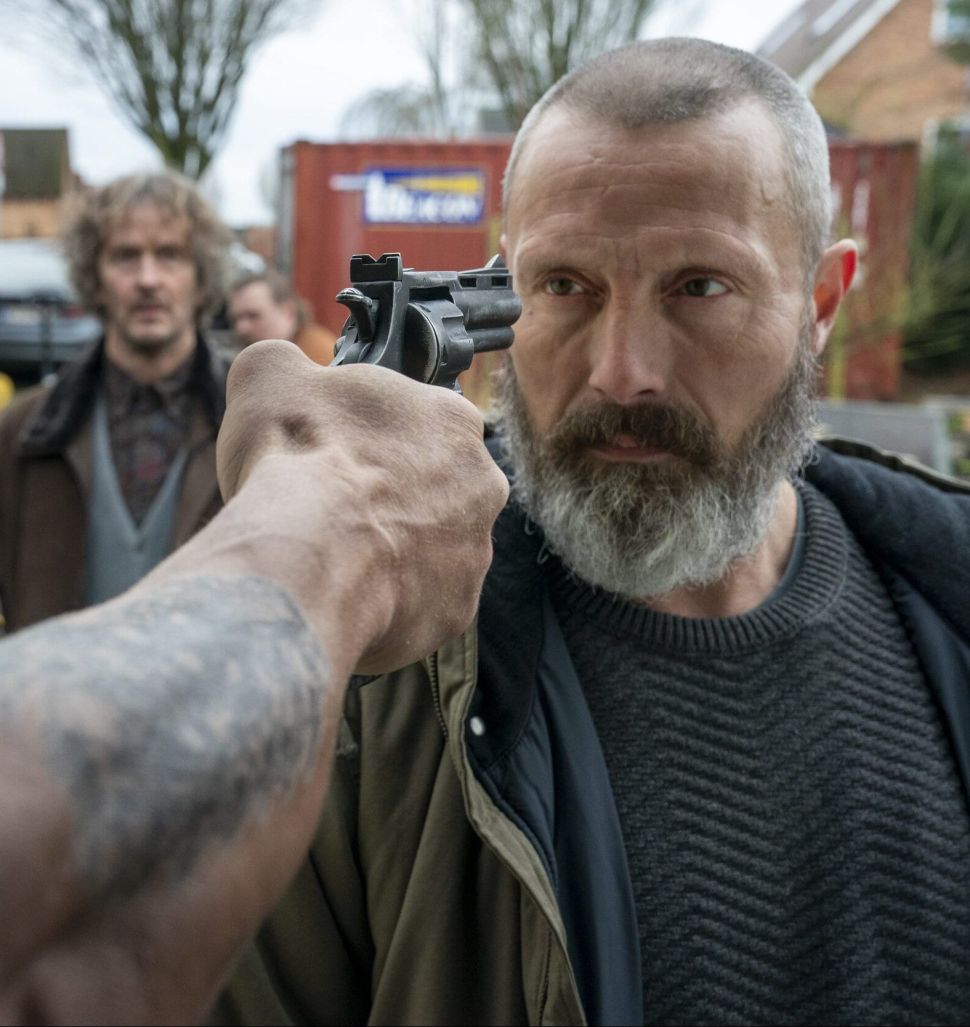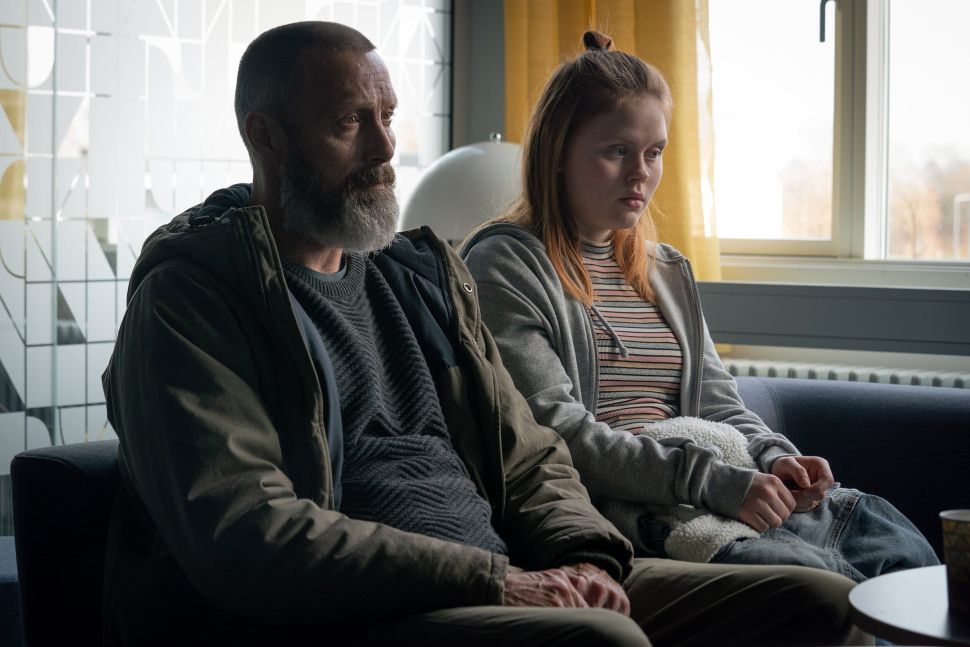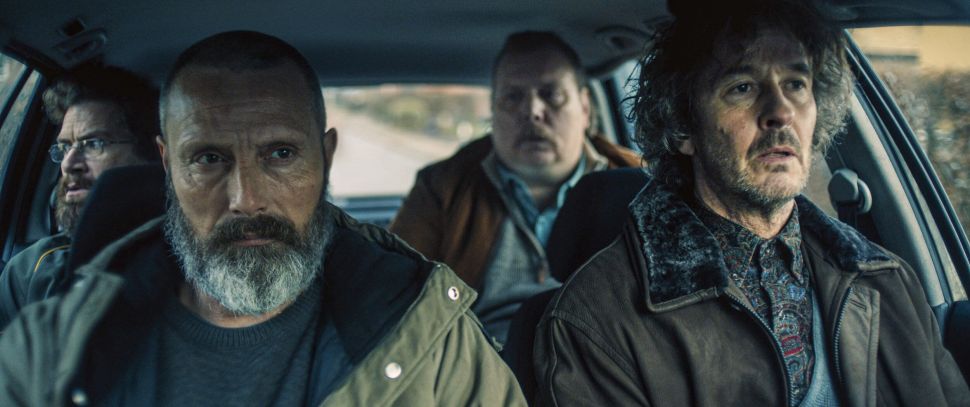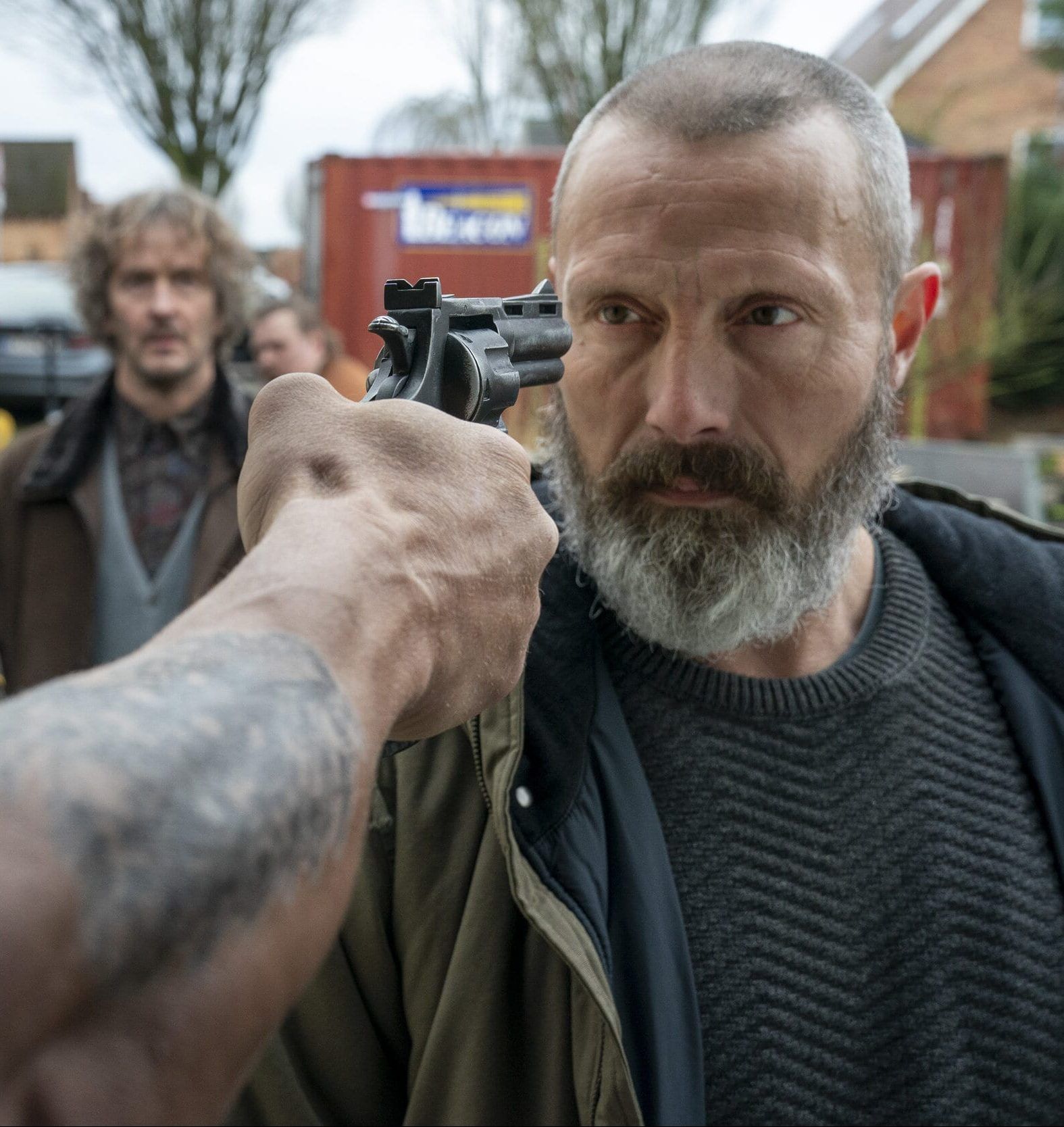
Indiana Jones. Fantastic Beasts. Star Wars. Mads Mikkelsen’s latest movie release is Riders of Justice, and he’s here to tell us how he unlocks all of his incredible roles. Rolf Konow/Photo courtesy of Magnet Releasing
For Mads Mikkelsen there’s no real distinction between being in a Star Wars movie and starring in an independent film in his own country of Denmark. The actor doesn’t feel the need to define himself, despite Hollywood often categorizing him as a villain, and for every blockbuster superhero film, Mikkelsen makes something like Oscar-winning Another Round. The actor’s latest is Riders of Justice, a Danish dark comedy from Mikkelsen’s long-time collaborator Anders Thomas Jensen, in limited theaters May 14 and on demand May 21.
Mikkelsen plays Markus, a stoic military man who comes home to look after his teenage daughter after his wife is killed in a train explosion. When a group of strangers appear on his doorstep claiming foul play, Markus gets sucked into a haphazard mission to seek out those who may have been responsible. It sounds like a revenge thriller, but that synopsis—as well as the film’s trailer—are slightly misleading. At its core, Riders of Justice is an unexpected story of human connection, shaking both the audience’s perception of genre and what you might anticipate from Mikkelsen.
There are certain types of characters that will stubbornly walk down the path as the strongest person in the world, carrying the entire world. They don’t realize they would be even stronger if they got a little help.
The actor, speaking from Spain over Zoom, told Observer about making the film, balancing a career in Denmark and Hollywood, what it was like to take over the role of Gellert Grindelwald from Johnny Depp in the upcoming third entry of the Fantastic Beasts and Where to Find Them series and his cryptic role in the next Indiana Jones movie.
Observer: At this point in your relationship, how does Anders Thomas Jensen approach you about a new film?
Mads Mikkelsen: He often tells me the pitch and the idea way before he starts writing anything. He kind of likes to spar with me. I think that I’m a guinea pig for if he’s gone too far or not. So if I start laughing and come up with ideas when he gives me the pitch it’s always a good sign. If I go, “What do you mean?†he might reconsider. But I’ve never done that! I’ve always been laughing when he pitches me anything. He’s a very unique filmmaker and he’s always very surprising with what he’s doing. This started off like that as well. He gave me the pitch and a few months later we had the first draft.


Mads Mikkelsen and Andrea Heick Gadeberg in Riders of Justice. Rolf Konow/Photo courtesy of Magnet Releasing
How similar was that pitch to what’s in the final film?
It’s more elaborate [in the film]. It’s more detailed. It’s pretty much what I suspected, but also packed with a lot of crazy stuff he didn’t tell me about. And some insane characters he forgot to mention. But it’s not that different. When we start working it’s always about “Here’s what we’re going for. How can we make a bridge between the story of my character and his daughter, and the insane people?†Because normally everything is taking place in that insane world, the one he’s creating in his film, but this time he wanted specifically to bring some of that realistic drama he writes so masterfully for other people. He wanted to bring that into the story as well. That bridge was very important for us to find, so we spent quite a bit of time discussing how to do that.
This film is very surprising, especially if you go in expecting the typical revenge movie. It’s completely different from what you think it will be.Â
Yeah. Back in Denmark, where people know Anders, a pitch like that can be fine because people know they’re going to watch Anders Thomas Jensen movie and it will always surprise them. In other parts of the world, it might be more unexpected because he is very unique. It’s not a revenge film—it is something very different. But it is also a revenge film. It’s a lot of different animals morphed together.
Was it at all a challenge to be in Markus’s head for several months?
No, I enjoyed him. I liked him a lot. He’s a man who’s not capable of communicating with the world, and he doesn’t necessarily think it’s necessary. He’s obviously suffering from PTSD. He’s one of these old school guys who thinks, Yeah, I have to handle this myself. No stranger can help me anyway. I have to go do this myself. And then disaster hits upon him and his family, and it turns out he’s no longer alone. He has to take care of his daughter and he’s not the right man for that. But luckily some insane people knock on his door and have a theory and then he can find a reason to live again. He can try to get some answers to his questions.
I had to conduct an orchestra of 80 people once. I had two hours to learn it. They were like, “Yeah, we’re not going to use you that much, and you’re never going to learn how to conduct. It’s way too difficult.†But I insisted. So I had this master conductor who showed me a few things.
Did you do any military training to prepare?
Yeah, I did some. We had a special-ops person showing me different things, specifically how to carry a gun. How you walk with a gun like that, which is changing, I guess, every five years when they get new guns. Five years ago it was super cool, but now it’s different. Carrying it in front of me was super awkward. But that’s the way they do it now. It was fun. I was never in the military myself. Sometimes I regret I didn’t volunteer because I do find that whole fantasy of what it is interesting. I get to touch upon that here. But reality of that? Luckily, I’m not part of that. But the whole thing that we played as kids I get to touch upon because I’m an actor. I get to ride a horse. I get to shoot a gun. I get to shoot an arrow.
Over the course of your career, what’s the strangest thing you’ve learned how to do for a role?
There’s been so many crazy things. I had to conduct an orchestra of 80 people once [in Coco Chanel & Igor Stravinsky]. It never made it to the film, but I have a personal tape of that. I kid you not, I had two hours to learn it. They were like, “Yeah, we’re not going to use you that much, and you’re never going to learn how to conduct. It’s way too difficult.†But I insisted. So I had this master conductor who showed me a few things. I knew the music inside out, so I stole some from him and then I went a little Charlie Chaplin with the whole thing and just went for it since I’m a dancer. Obviously, the first violinist was the conductor in real life since he was a real musician. They were just looking at me like, “What is he doing up there?†I really enjoyed it.


Riders of Justice. Photo courtesy of Magnet Releasing
Do you learn something about yourself with each role you do?
Already on the script level, me reading it and discussing it, I think I’ve already learned a lot from it. Once I start diving into the character and bringing them to life I have to be the master of them. I have to be a little smarter than the character. I am the manipulator of my character. So, in general, no I don’t learn a lot from it [about myself], but there’s something that rubs off on me every time and it’s hard to put a finger on what that is.
How do you stay smarter than someone like Markus who is already quite smart?
Well, he’s smart in certain ways. Like Einstein was smart in certain ways. But then in other ways, I have to see: That’s his flaw. He doesn’t see himself and I’m going to investigate that. I’m going to put that on the big screen for everybody to see where is his flaw. And Markus’s flaws are very obvious—as a human being he has quite a few. First of all, one of things he has to learn is how to ask for help. He needs help. That makes me smarter than him! It’s not for all people and not everyone asks for help, but there are certain types of characters in the world that will stubbornly walk down the path as the strongest person in the world, carrying the entire world. They don’t realize they would be even stronger if they got a little help.
Has the recent success of Another Round changed anything for you in your career?Â
It’s given Danish cinema a re-boost, I would say. The boost came in the ‘90s with the whole Dogme things, and then in then in the mid-2000s a lot of stuff happened as well. We’ve been spoiled for the last couple decades. But it goes up and down, and I think this is definitely the re-boost for Danish cinema. What rubs off from that, I don’t know. It’s just been a fantastic journey to be on and also to see that people have embraced the film, across cultures and across countries. Even though we have different cultures when it comes to alcohol we have one thing in common: life. That was a film about reclaiming your life and I think that rang a bell with a lot of people.
Did the awards success for the film surprise you?
We were in a bubble when we did the film. We just wanted to make the most life-affirming film possible. And I think we did. Then we had an opening in Denmark and it was a massive success. It was huge audience-wise and critic-wise. We were just blown away by that. Then it started traveling and we were like, “Okey-dokey, we have not only made a Danish film, but we’ve made an Italian film.†Maybe we were surprised. We didn’t really aim for the stars with this one. We wanted to do it for [Thomas Vinterberg’s] daughter and that was the sole goal of the film. And then everything coming our way was a tribute to her.
How do you balance doing big Hollywood productions with Danish films with directors you’ve worked with before?
Very easily! I pick up the phone and I have a conversation with my old friends and if they have something where they want to invite me into their world, I’m game. It’s not a big, tricky thing for me. If they do a film every fourth year and they call me every fourth year, that’s the plan. Quite a few of my friends I’ve worked with more than once I have that relationship with. There’s a certain amount of trust that even if a pitch is sounding weird or I don’t really get it, I know who they are and I know that down the line there will be more to the pitch. It will be about something more and much deeper than the pitch itself. The pitch is always just a kickstarter to tell the true story.
Do you have aspirations to direct?
Sometimes when you’re standing somewhere and nothing is going right and you’re just like “Let me have it for one hour, please!†Then I have aspirations to direct. But I kind of get that hunger fulfilled when I work with Anders or Thomas because they invite me into the process so early on. I feel like I’m a collaborator somehow. Obviously they will be the boss—and you only need one boss—but I feel like I’m being invited in. So far I haven’t had the urge. But when my face gets really annoying to watch I might have to jump to the other side.
How will you know when your face is getting annoying to watch?
I’m sure the critics will tell me! Or maybe my wife will tell me.
Have you been able to work during the pandemic?
We wrapped this film right before the shutdown. And then I didn’t do anything for seven or eight months. And then I’ve done Fantastic Beasts and that’s it. I spent three or four months on that one.
How did it feel to be back on a set after all that time?
I always have long breaks between things, as much as I can. If I can make a big chunk of time between things I’m super happy. I like that time, but I also like that I can have a different look. I don’t have to wrap it up and then start something the next week and have the same facial hair and the same hair. I like to be able to do something a bit more radical. So this was a slightly longer break. I didn’t miss it, in that sense, because I had a great time with my family and my little new dog. But it was great to come back. It was obviously on different terms—everybody was wearing masks. I saw the face of our director [David Yates] for the first time on the last day after working with him for four months. That is obviously completely insane and surreal. But having said that, we were able to work.
Were you able to make the character of Grindelwald your own?
Yeah. I think they were very open to that and that’s what they wanted. They obviously know, as I do, it is creative suicide to try to copy something else. It’s just dumb. [Johnny Depp] made the character and he was great at it, so we did need to find our own path. That’s what [the filmmakers] were insisting on as well.
Why are you always playing villains?
First of all, that’s what I get offered in America! I’ve done a few other things that have not been villains, and more and more are coming my way the more they see films like Another Round or Riders of Justice. But villains are interesting. If they are well-written they have a mission. A mission where we as an audience go, “He’s not that off. He’s on to something.†If that is part of the story, then it’s interesting. We want to give the audience a slight dilemma. A little understanding on why this guy is going to the left as opposed to the right.
What’s your next project?
I am going to be part of the new Indiana Jones, which starts shooting very soon.
As the villain?Â
I can’t reveal that. But have a guess. [Laughs.] He’s just a misunderstood person.
Riders of Justice is in theaters May 14 and on demand May 21.

